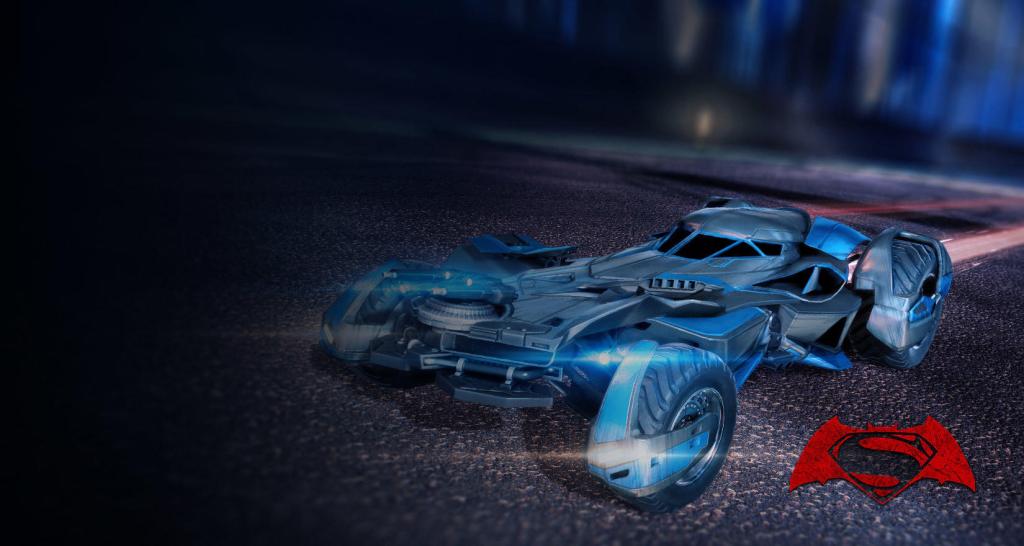Rocket League added another high-profile tournament to its repertoire this weekend with Turner Sports’ The ELEAGUE Cup: Rocket League, an invitational event with eight top teams and a three-part tie-in TV series airing on TBS this month.
The tournament had a wild finish on Sunday with G2 Esports—a popular, albeit up-and-down North American team—toppling the reigning Rocket League Championship Series champs, Europe’s Gale Force Esports. It was a thrilling series with lopsided wins on both sides and a dramatic game-six overtime goal to force a final game, but Gale Force just couldn’t close in the end. And the previously-inconsistent G2 finally has a major win under its belt.
Videos by VICE
What we didn’t see across the entire weekend, curiously, was the Batmobile—an in-game car that certain pro players swear by for its long hitbox and heavy impact when striking the ball. Mock-It Esports player Victor “Fairy Peak!” Locquet is one of those well-known Batmobile users, but when the tournament began, he picked the generic Octane car instead. Switching cars for the start of a major tournament is uncommon for pro players, given everything at stake.
On Friday, Mock-It tweeted that the Batmobile been banned from the tournament due to licensing concerns, although that tweet was later deleted. Fairy Peak! ultimately played well with Octane, as Mock-It made it into the Top 4 at ELEAGUE after finishing 7th-8th at this month’s RLCS World Championship. He seemed to take the change in stride after their early-weekend success, tweeting, “Maybe Octane was the secret.”
Rocket League developer Psyonix confirmed to Waypoint that a licensing hitch was indeed at play. “The licensing agreements we have in place for our licensed cars (like Batmobile) don’t include the ability to use the IPs in promotional materials,” says a studio representative. “Although it was not a tournament rule, ELEAGUE asked players to avoid using any of the licensed cars for the tournament because of this.”
Article continues below
An ELEAGUE representative, meanwhile, suggested that while teams were asked not to use the licensed cars, it was not a hard requirement: if a player wished to stick with a car like the Batmobile, then there would be no penalty for doing so. Furthermore, the rep claims that no teams pushed back against the request. But teams in the position to benefit from the spotlight and prize pool of a large tournament—and potential future events—in a growing pro scene may not feel like they are in a position to make waves.
“Our players were told they could not use the Batmobile due to a licensing issue. It was not outlined in the rules, so technically teams could have used the cars,” affirms Mock-It Esports CEO Marshall Long via email. “But in general, Rocket League teams comply with requests from tournament organizers that have an implication attached to them.”
Another ELEAGUE team shared off-the-record that they were handed a list of prohibited cars, skins, and topper items shortly before the tournament started. They believed that the items were fully banned from use, and that there was no suggestion that teams could argue in favor of equipping anything from that list. However, the excluded items did not impact that particular team’s players, so they didn’t inquire further.
Licensing hitches haven’t been an issue with previous tournaments, as the Batmobile has been seen all over the RLCS and other events—but now it potentially affects future Rocket League competition. Will pro players continue to use licensed cars with the threat of having them blocked from big-money tournaments?
Players spend thousands of hours commanding these cars, and often have developed their play styles around the look and feel of a certain vehicle. And the hitbox differences between the Octane—the overwhelming pro favorite—and Batmobile are significant. Octane is a strong all-around car with a taller hitbox, which offers a slight advantage during 50-50 encounters, or when hitting the ball at the same time as a rival on the opposite side. It’s the car that the vast majority of pro players use.
The shorter Batmobile, meanwhile, packs more of a punch and has a longer hitbox, plus it’s considered the best car for dribbling the ball in the air—but it can struggle during those 50-50 matchups. The pro scene has several Batmobile users who have mastered the car’s nuances and thrived because of it, and a late request to change cars could disrupt a player’s ability to perform at his or her usual level.
For their part, Mock-It aren’t too upset now that the weekend is done, with Long calling The ELEAGUE Cup the “most well-organized and best-produced tournament in Rocket League‘s history.” But the licensed cars hitch is an anomaly to that statement, and it’s something that must be addressed for future events from ELEAGUE or other sponsors. “We understand that licensing issues can be a hindrance. However, in a game where these licensed cars can have an affect on gameplay, there needs to be clear consideration for this. Forward-looking planning is a must,” he says, noting that Counter-Strike: Global Offensive and other games don’t encounter these kinds of tie-ups.
Psyonix says that the licensing issue is something that they will “look into potentially updating for future tournaments and broadcasts.” Surely other Batmobile enthusiasts in Rocket League‘s competitive community are waiting to hear a final answer on the matter.




